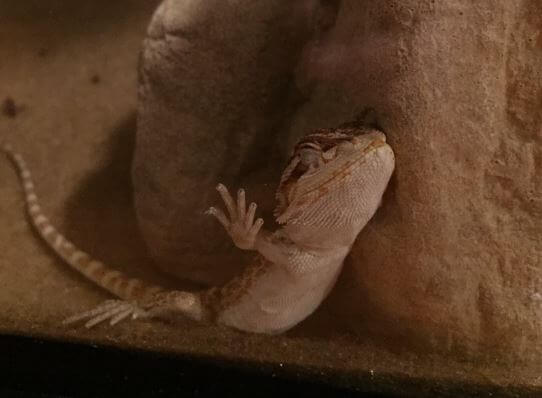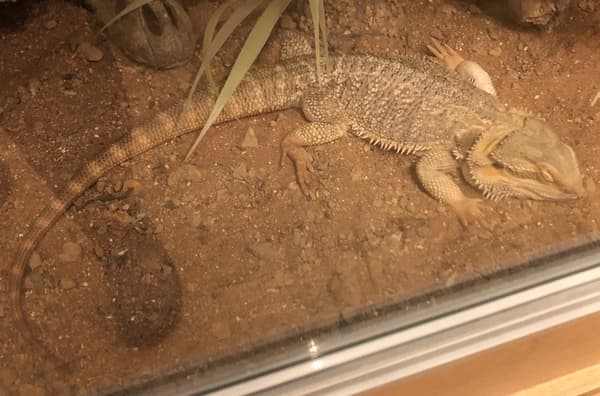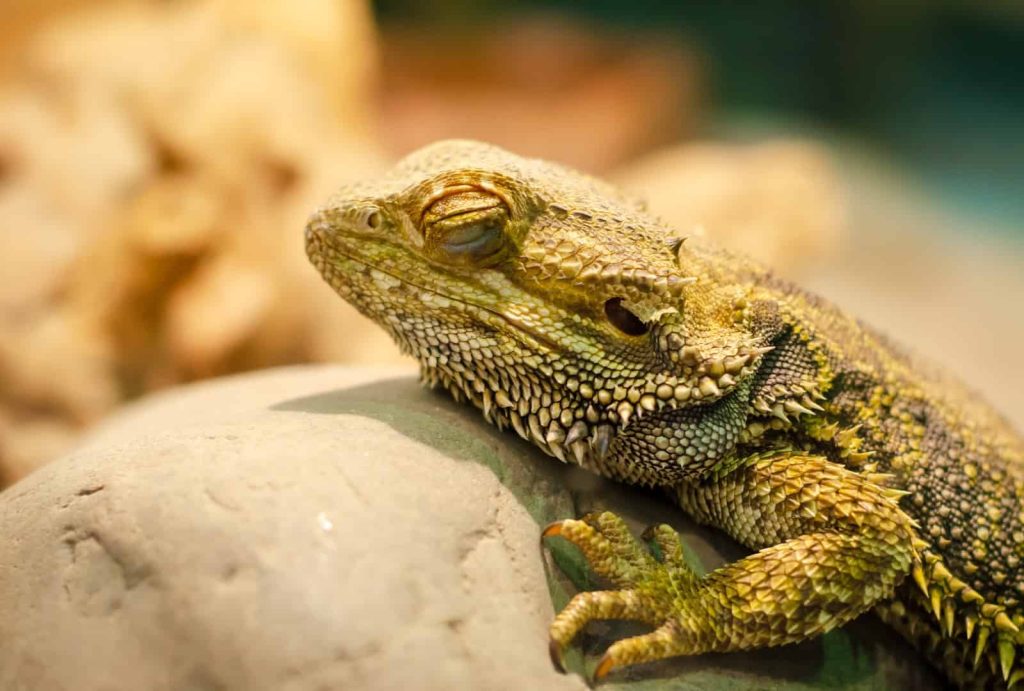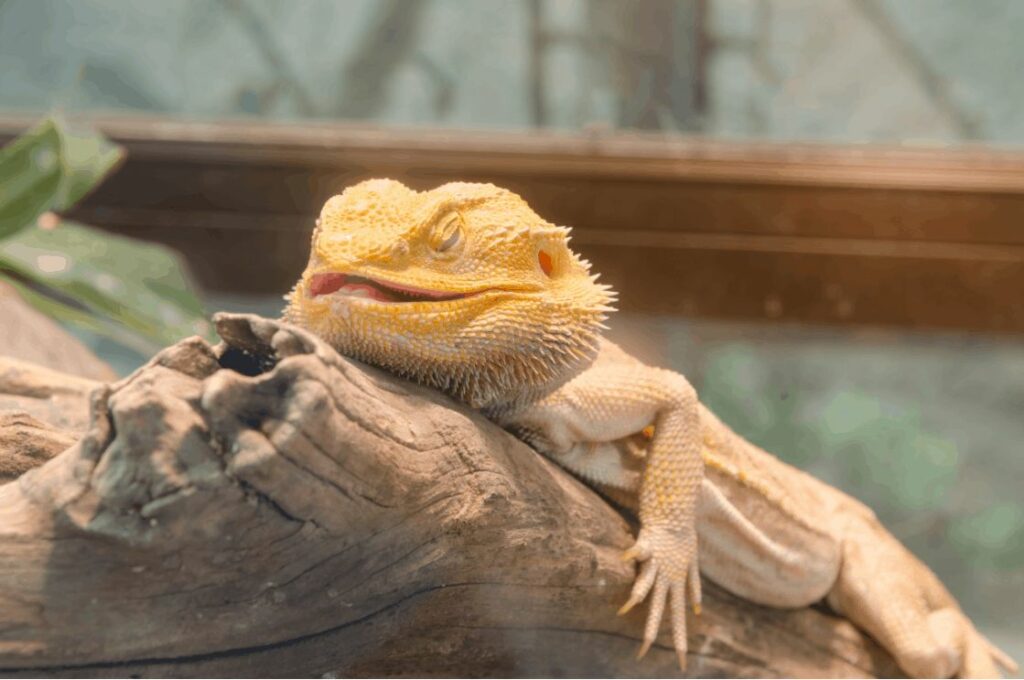The bearded dragon is an adorable, kind, and lovely reptile species. They show some adorable and peculiar behaviors. Some of these behaviors and characteristics make owners fond of them.
Especially when the owner is aware of the importance of this gesture. A bearded dragon, as is often claimed, is a diurnal mammal like us people. In general, bearded dragons sleep more than the average person.
Compared to the normal person, bearded dragons typically sleep more. They get 8 to 12 hours of sleep at night and in the morning.
Bearded dragons sleep in the dark in the wild, so when it’s time for them to go to sleep, you must turn out the lights and make the room dark.
Only when it’s time to sleep do they appreciate the darkness. Your bearded dragon will sleep more if the night is longer than the day’s duration. In order to promote growth, development, body repair, and optimum health, sleep is too much important for these species.
Bearded Dragon Sleeping Habits and Sleeping Position
Bearded dragons are interesting little mammals. Waving their arms, glass surfing, licking you and objects in their enclosure, and not eating are just a few of the strange things they do that can worry their owners.
There are two main odd sleeping habits these are- your bearded dragon may exhibit an upright sleeping position and sleep in the corner.
Upright Sleeping Position

There are a few reasons your bearded dragon might find it pleasant to sleep upright position, despite the fact that this behavior may seem odd to some people. Remember that your bearded dragon won’t get hurt by this sleep position.
This sleeping position is common among bearded dragons. Increased stress levels, improper temperature, and humidity levels, the bearded dragons’ enjoyment of the posture, and other factors are the main reasons for sleeping in this pose.
Sleeping in the Corner

Sometimes, you might catch your bearded dragon sleeping in the corner. Although this behavior is usually totally normal, it might sometimes be cause for worry, especially if you’re new to owning bearded dragons.
They are quite active if a bearded dragon is healthy and not brumating. They’ll have therefore explored everywhere in their enclosures for the ideal place to sleep.
This might be in the corner of their enclosure because it’s the coziest spot or the ideal temperature. Other signs of something wrong may include your bearded dragon sleeping in a corner.
Your beardie can be so seriously impacted that it cannot move out of the corner, or it might be too weak or lethargic due to being ill or having a high parasite load.
Some of the good and some bad reasons for sleeping in a bearded dragon’s corner are discussed in detail below:
Good Reasons Your Bearded Dragon is Sleeping in the Corner
Bearded sleeping in the corner that maybe that is the perfect spot for them or they are Brumating. Your bearded dragon may find the corner where they are sleeping the most comfortable spot in their entire habitat, which is why they return to it several times again.
Moreover, it can be the ideal temperature and lighting conditions, and they just can’t help but stay there. Most of its time is spent in its enclosure, where your bearded dragon can select “spots” for activities, including feeding, removing, sleeping, and scratching the substrate.
It’s possible that your bearded dragon has chosen that particular corner of its enclosure as its sleeping area. You can put small beds on the floor or small hammocks so that your bearded dragon has more sleeping options, making them more comfortable in the corner.
In addition, bearded dragons like to hide during their brumation period, so they sleep in corners.
Bad Reasons Your Bearded Dragon is Sleeping in the Corner
Unfortunately, not all reasons for why your bearded dragon is curled up in a corner are positive. It’s frequently a signal that something is wrong with them or their enclosure, and they either wound up in that corner by accident, or it’s the only area they feel comfortable with.
If the temperature gradient is wrong or they feel extra stressed Out and scared, they feel the corner is the safe place for them. That’s why your beardie is sleeping in the corner.
Also, they sometimes sleep in corners if they are unable to move due to illness. The best thing to do in this case is to take them right to the vet.
Reasons Why Your Bearded Dragon is Sleeping Too Much

There are various reasons your beardie may be hitting the snooze button if it is extremely tired. Find out the possible causes of your bearded dragon’s frequent sleeping by reading the suggestions below.
1. Due to brumation
Bearded dragons, in captivity, hibernate for a considerable time each season. Weeks or months may pass before it ends. Before the breeding season, there is brumation. They rarely eat, drink, or pass excrement while brumating.
They are dormant for a very long time. Your bearded dragon will spend a lot of the day sleeping during brumation. Brumation often lasts between one and three months.
Do not be alarmed if your beardie is going through this. It is acceptable behavior. The symptoms listed below will help you figure out if your bearded dragon is brumating:
- Going to bed an earlier
- Diminished appetite
- Hiding more
- Defecating less
- Lethargy
2. For Dark Out
Beardies favor nighttime darkness while sleeping, unlike the majority of reptiles. In other words, there’s a possibility that a really dark, rainy day might give your bearded dragon a little extra sleep.
This is very normal, and you might even recognize your or other pets’ tendency to sleep during a storm. Even if their habitat has a decent UVA/UVB bulb, the outside environment can still impact them.
Therefore, ensure you have an appropriate UVA/UVB light. Try MyComfyPets UVB Light and UVA 2-in-1 Reptile Bulb 100W bulb.
3. due to cool
Check your terrarium’s temperature if your bearded dragon seems to be sleeping more than usual since if it gets too cold, this pet will become less active and spend more time sleeping.
Purchase a reliable thermometer, check that the basking temperature is between 95°F and 110°F, or ten degrees lower for hatchlings, and that the colder side temperature is between 80°F and 85°F.
Keep in mind that these species cannot digest their food in the cold, and if the low temperature persists for an extended period of time, they risk being ill and developing other health issues. So try to keep them at an ambient temperature.
4. If They haven’t eaten enough
Wild bearded dragons will enter brumation whenever they notice food diminishing because a lack of it in the wild is a sign that the seasons are changing.
Their little bodies may seek sleep for survival if you forget to feed your pet or if they just haven’t eaten enough. Make sure the child is getting enough to eat.
5. If They are Stressed Out About Something
If you’ve ever had to handle too many projects at once, you are aware of how exhausting stress can be. The same is true for your bearded dragon. Stress can show as a disease with low activity, tiredness, and excessive stinking feces and can happen for various causes.
The most common cause is the bad environment, but it could also be anything as simple as hearing too many loud noises or being handled more often than they would want.
Ensure they have enough room in their environment and aren’t sharing with any “friends.” Adult bearded dragons do best in tanks that are 40 gallons in size, and they usually do not get along with other pets.
To help your bearded dragon relax, think about taking a nice, warm bath.
6. due to sickness
When sick, most beardies tend to sleep more and show other symptoms related to the various diseases or disorders they are dealing with, such as lethargy, loss of appetite, and weight loss.
Give them a proper diagnosis from your herp veterinarian, and then treat them accordingly. Don’t disregard any illness-related symptoms.
7. If They have an unbalanced diet
Due to their omnivorous nature, bearded dragons require a diet that includes both leafy greens and insects. While most greens will work, spinach, cabbage, and iceberg lettuce don’t blend well with them.
Instead, consider red-leaf lettuce or mustard greens. Crickets are an excellent source of protein, although moderation is advised.
Usually, 80% fruit and vegetables and just 20% protein should make up an adult bearded dragon’s diet; protein should only be consumed about twice per week.
In contrast to their protein diet, bearded dragons benefit greatly from calcium supplements.
Conclusion
A bearded dragon’s sleep schedule is one of the features that makes it a good pet choice. Some of its sleeping patterns are peculiar and could be interpreted as symptoms of an illness or condition.
These features are expected and normal behavior. However, if your bearded dragon appears sleepy throughout the day and is not brumating, consult your veterinarian as soon as possible because there may be a medical issue.
FAQs
Do bearded dragons have brumation in the summer?
Brumation is essentially the cold-blooded version of hibernation, which naturally happens in the winter months when it gets colder, and food is more difficult to come across.
However, your bears’ internal clock might be indicating to them that winter should be here. Brumation may be completely avoided in a well-stocked environment. A bearded dragon in a comfortable and well-stocked environment may completely avoid brumation because a shortage of resources and a temperature change are two natural causes of the condition.
Why is my bearded dragon sleeping on the floor?
Bearded dragons may attempt to regulate their body temperature by flattening out to absorb as much heat as they can if their terrarium is too cool. That’s why often dragon’s sleep on the floor.
do bearded dragons sleep with their eyes open?
Your dragon may not be eating and sleeping too much since he is about to brumate. A dragon goes into a state of deep sleep known as brumation. It does not need to eat during this time because the process of digestion will shut down. This natural process occurs in a lot of domestic lizards.
Why is the baby bearded dragon sleeping too much?
Generally speaking, baby lizards can function just fine on an adult’s amount of sleep, but during their first year of life, they go through a lot of growth. Bearded dragon babies sleep more frequently than adult bearded dragons. Although it may be because they are more sensitive to environmental changes or imbalances than adults, this is normal for newborns.
Do bearded dragons dream?
According to a study on bears, they experience REM which means rapid eye movement sleep and slow-wave sleep, making it possible for them to dream while asleep. This is similar to how humans, mammals, and birds do. This assessment was reached by researchers who observed subjects’ sleep-related brain activity.
Hugues Beaufrere is the Exoticpetia’s senior writer and reptile expert. He has been fascinated by reptiles and monkeys since he was a kid and had years of experience in herpetology and primatology. He has cared for various kinds of Monkeys, Lizards and Reptiles and loves to share his knowledge and passion with others.


